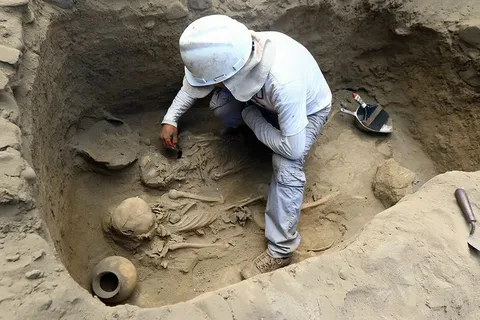Subtotal $0.00
Archaeology is more than just digging in the dirt; it’s a meticulous science that unearths the stories of our past. Archaeological firms play a crucial role in this process, serving as the backbone of cultural heritage preservation. From excavating ancient ruins to conducting research and assessments, these firms are essential in ensuring that history is not lost to time. In this article, we will explore the multifaceted functions of archaeological firms, their importance in heritage management, and the challenges they face in today’s world.
Understanding Archaeological Firms
Archaeological firms specialize in the study and preservation of cultural resources. These firms comprise teams of trained professionals, including archaeologists, historians, and scientists, who work together to uncover and analyze artifacts, structures, and other material remains from the past. Their services are often sought by government agencies, private developers, and non-profit organizations, especially when construction or land development projects might impact historically significant sites.
Key Services Offered by Archaeological Firms
- Cultural Resource Management (CRM)
Cultural Resource Management is a vital service offered by archaeological firms. CRM involves assessing the archaeological significance of a site before any development can take place. This process ensures that valuable historical resources are documented, preserved, or mitigated in compliance with local, state, and federal regulations. By conducting thorough assessments, archaeological firms help prevent the destruction of irreplaceable heritage sites. - Excavation and Analysis
Excavation is one of the most visible aspects of archaeology. Archaeological firms conduct systematic digs to uncover artifacts and features that provide insights into past human activities. Once artifacts are retrieved, they are analyzed in laboratories, where specialists study their age, materials, and usage. This analysis can reveal important information about historical societies, their cultures, and their interactions with the environment. - Public Archaeology
Many archaeological firms engage in public archaeology initiatives to educate communities about their local history. This can include community digs, workshops, and educational programs designed to involve the public in archaeological work. By fostering a connection between the community and their heritage, these initiatives help raise awareness and appreciation for cultural resources. - Consultation and Reporting
Archaeological firms often provide consultation services to developers and government agencies. This includes advising on best practices for minimizing impact on archaeological sites and preparing reports that outline findings from assessments and excavations. These reports are essential for compliance with heritage management regulations and help inform decision-making processes.
The Importance of Archaeological Firms in Heritage Management
Archaeological firms play a critical role in heritage management, ensuring that cultural resources are identified, preserved, and protected. Their work contributes significantly to our understanding of human history and cultural diversity. Here are several reasons why archaeological firms are indispensable:
- Preservation of History
The primary goal of archaeological firms is to preserve our history for future generations. By documenting and protecting archaeological sites, these firms ensure that stories of past cultures are not lost. This preservation helps maintain the cultural identity of communities and promotes a sense of belonging among residents. - Educational Opportunities
Archaeological firms provide invaluable educational resources for schools, universities, and the general public. Through workshops, lectures, and community events, these firms disseminate knowledge about archaeology and its significance. This education fosters a deeper appreciation for history and encourages individuals to become stewards of their cultural heritage. - Economic Benefits
Beyond cultural preservation, archaeological firms can provide economic benefits to local communities. Heritage tourism, driven by interest in archaeological sites, can boost local economies by attracting visitors and creating jobs in sectors such as hospitality, retail, and services. By highlighting historical significance, archaeological firms contribute to sustainable development and community growth. - Mitigating Impact of Development
As urban areas expand and infrastructure projects increase, archaeological firms play a vital role in assessing and mitigating the impact of development on archaeological sites. By conducting thorough assessments, these firms can recommend strategies to minimize disruption, ensuring that development can proceed while safeguarding cultural resources.
Challenges Faced by Archaeological Firms
While the work of archaeological firms is crucial, it is not without challenges. Several factors can impact their ability to carry out their missions effectively:
- Funding Constraints
Many archaeological firms operate on limited budgets, relying heavily on grants and contracts for funding. As competition for resources increases, securing funding for projects can be a significant challenge. Without adequate financial support, archaeological firms may struggle to conduct comprehensive assessments and excavations. - Regulatory Hurdles
Navigating the regulatory landscape surrounding cultural resource management can be complex. Archaeological firms must comply with various laws and regulations, which can vary by jurisdiction. This complexity can lead to delays in projects and may hinder the timely preservation of archaeological sites. - Public Awareness and Support
Despite their importance, archaeological firms often face challenges in raising public awareness and support for their work. Engaging communities and educating the public about the value of archaeology is essential for garnering support for preservation efforts. Without public backing, funding and regulatory support may diminish. - Environmental Factors
Climate change and environmental degradation pose significant threats to archaeological sites. Rising sea levels, extreme weather events, and urban development can lead to the destruction of historically significant locations. Archaeological firms must adapt their strategies to address these environmental challenges and work towards sustainable practices in their research and preservation efforts.
The Future of Archaeological Firms
As we look to the future, archaeological firms will need to adapt to an evolving landscape. Embracing technology will be crucial in enhancing their research capabilities. Innovations such as remote sensing, digital mapping, and 3D modeling can improve site assessments and facilitate more efficient excavations.
Moreover, collaboration between archaeological firms, government agencies, and local communities will be essential for effective heritage management. By working together, stakeholders can develop comprehensive strategies that prioritize cultural preservation while allowing for responsible development.
Conclusion
Archaeological firms are vital players in the preservation of our cultural heritage. Their work ensures that the stories of our past are documented, understood, and appreciated by future generations. By navigating challenges and embracing new technologies, these firms can continue to uncover the past and contribute to a deeper understanding of human history. Supporting archaeological firms is an investment in our shared cultural legacy and an opportunity to foster appreciation for the rich tapestry of human experience.
For more information on the essential role of archaeology in cultural resource management, explore our comprehensive guides on heritage management services.









